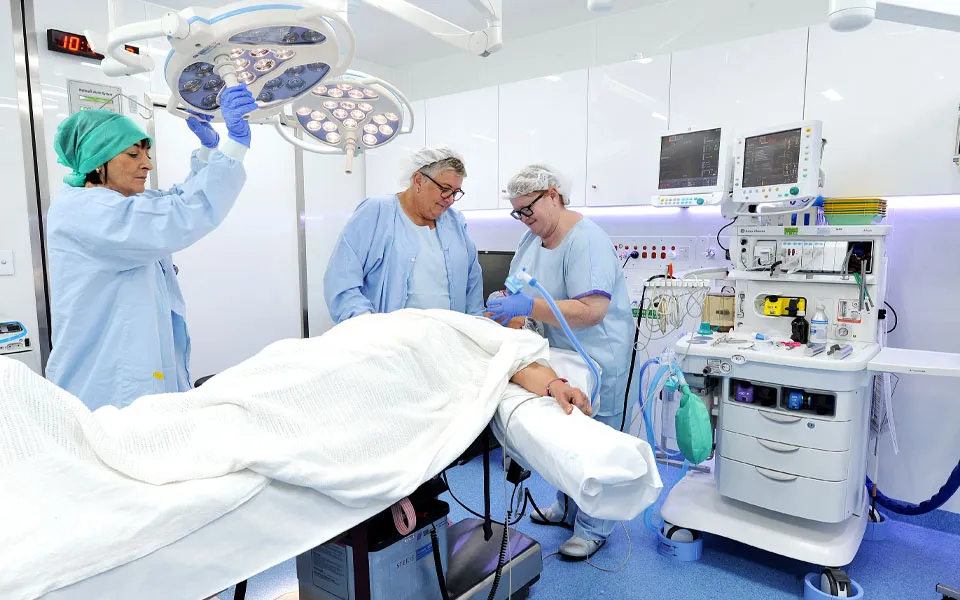
Rapid deployment of modular healthcare facilities to maintain and expand critical hospital services

Background
Hospitals worldwide face significant challenges in maintaining and expanding services during infrastructure upgrades or when confronted with urgent capacity demands. Without temporary or rapidly deployable facilities, communities risk service interruptions, costly patient transfers and reduced access to timely care.
Aspen Medical’s modular clinical infrastructure provides a flexible, fully equipped solution, whether for surgical, emergency, ward or other acute care services, during planned refurbishments, unexpected outages or capacity expansions. Units can be deployed as standalone facilities or with clinical teams, and are designed to meet or exceed relevant healthcare standards in any jurisdiction.
This approach has been successfully implemented in diverse and challenging environments. Some examples from Australia, include:
- maintaining surgical services during a six-month operating theatre refurbishment at Gladstone Hospital, avoiding the need to transport patients to other facilities.
- providing a temporary emergency department and operating theatre during renovations at Longreach Hospital, ensuring uninterrupted care in a geographically isolated region.
- delivering a temporary operating theatre during major refurbishment at Moree Hospital, completing hundreds of surgical procedures and avoiding significant patient transfer costs.
- enabling 80% of normal surgical activity during a six-week theatre upgrade to Moruya Hospital, meeting surgical targets despite the reduced capacity of permanent facilities.
- delivering a 12-bed inpatient ward for Toowoomba Hospital in just 15 weeks from final design sign-off, reducing emergency department overcrowding and improving patient flow.
Approach
Aspen Medical delivered turnkey modular healthcare facilities tailored to the needs of each site. Key elements included:
- end-to-end delivery – logistics planning, transport, installation, commissioning and ongoing maintenance
- customised configurations – from operating theatres to ward spaces and emergency care units, adapted to local clinical workflows
- fully equipped environments – integrated medical gases, nurse stations, recovery bays, secure medication rooms and patient amenities
- rapid build times – with pre-fabrication off site to minimise disruption, followed by accelerated on-site installation
- capacity building – training local teams in facility operation and maintenance
- global compliance – facilities designed to meet or exceed local building and healthcare standards, including infection prevention and control requirements.
In each case, strong collaboration with hospital leadership and health authorities ensured smooth integration of the modular facilities into existing health services.
Results
Across these deployments, Aspen Medical ensured uninterrupted care and delivered measurable outcomes. In Gladstone, surgical services continued on site with no patient transfers, maintaining consistent care for the local population. In Longreach, full emergency and surgical coverage was sustained for a remote community with no alternative facility nearby. At Moree, 349 procedures were completed, including 56 emergency surgeries that would otherwise have required costly transfers, resulting in significant savings. In Moruya, 80% of surgical activity was maintained during refurbishments, meeting throughput targets. At Toowoomba, inpatient capacity was expanded by 12 beds in just two weeks on-site, easing pressure on emergency services.
Outcome
These projects highlight Aspen Medical’s ability to safeguard and expand essential hospital services anywhere in the world, even in remote or resource-constrained settings. The modular healthcare infrastructure model:
- protects patient safety and ensures continuity of care during disruption
- eliminates or reduces the need for patient transfers
- expands capacity quickly without prolonged on-site construction disruption
- delivers high-quality, compliant healthcare facilities in any location or environment
- strengthens resilience and preparedness within healthcare systems.
From coastal communities to remote inland regions, Aspen Medical’s modular solutions ensure that healthcare continues and grows when it matters most.

